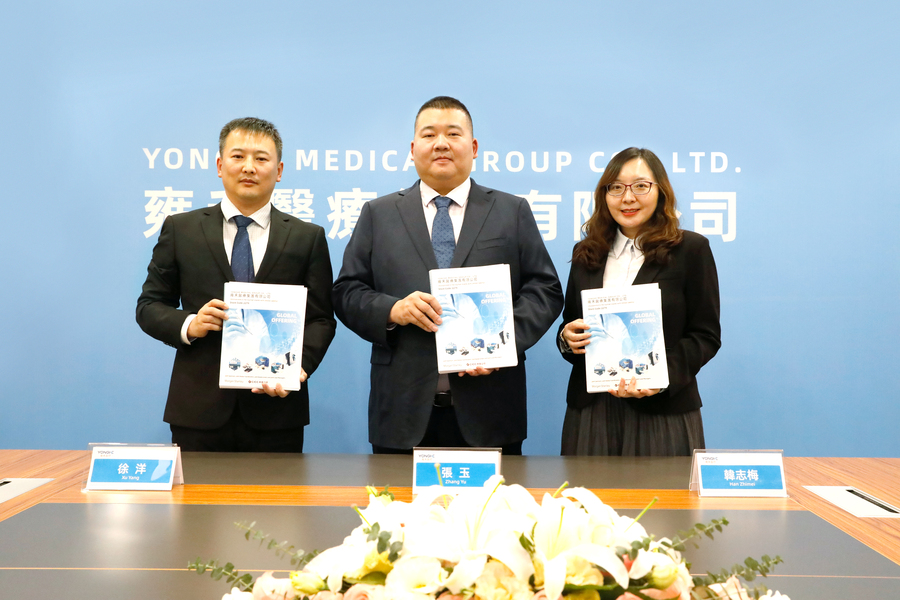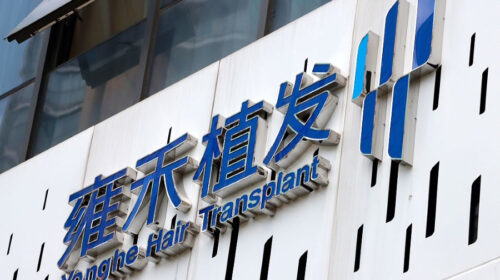Yonghe Cuts IPO Path Through Legions of Bald Men

Leading Chinese hair transplant specialist aims to raise HK$1.5 billion through Hong Kong listing
Key takeaways:
- Yonghe Medical sees huge growth potential in transplant and other hair care services from China’s appearance-conscious growing middle class
- Company is floating shares at a high valuation, with a forecast P/E ratio of 85 times
By Jony Ho
Can an enterprise worth billions build an empire on the suffering of others? Perhaps. Hair loss often seems inevitable as people age, spelling discomfort for many. But that’s creating a huge opportunity for the few who can tackle the condition.
Established in 2005, Yonghe Medical Group Co. Ltd.(2279.HK) is one such hair transplant specialist that thinks it can. The owner of the locally well-known “Svenson Medical Hair Care Center” chain in China officially launched its Hong Kong IPO this Wednesday, raising a heady HK$1.5 billion ($192 million). Its shares will start trading on Dec. 13, giving it the distinction as Hong Kong’s “first hair transplant stock.”
One in every six Chinese, or approximately 250 million citizens in the country, has experienced hair loss problems, according to data cited in Yonghe’s IPO prospectus from the National Health Commission of China in 2019. Some 84% of people with hair loss are younger than 30 years old, it added.
Separate data cited in the prospectus from market research firm Frost & Sullivan showed China’s hair medical services market was worth 18.4 billion yuan ($2.89 billion) last year, and is expected to rise sevenfold to 138.1 billion yuan by 2030. That reflects a major business opportunity for selling hair transplant services to millions from China’s fast-growing affluent middle class.
Sector leader
Yonghe provides hair transplant services from 51 centers in 50 cities across China. It was the largest such provider in China last year with a 10.5% market share, based on its total income and patient volume.
Yonghe’s hair transplant services have also been growing at a steady clip, from about 35,000 procedures in 2018 to 51,000 last year, with the average patient spending as much as 28,000 yuan. The company is also quite profitable, maintaining a gross profit margin above 72% over the last three and a half years.
Yonghe will offer 94.42 million shares in the listing, representing 18.1% of its total of approximately 520 million shares. The distribution of shares between the international and local portions of the offering has been set at nine to one, with shares priced at HK$15.80. It said it will use the funds raised to expand and upgrade its hair transplant centers, enhance brand awareness, and for R&D.
As its base of hair-challenged customers has grown, Yonghe’s revenue reached 1.64 billion yuan last year, up 34.4% from 2019. The business further accelerated in the first half of this year, with revenue soaring 75% year-on-year to 1.05 billion yuan. With such “thick” possibilities, the company looks eager to tap the financial market to finance its growth in the years ahead.
Hair transplants are currently Yonghe’s top business, accounting for the vast majority 98% of its revenue in 2018 and 2019. In a diversification bid, Yonghe launched separate medical hair care services in 2019 and recorded revenue of 15.06 million yuan that year. Revenue from that business soared the next year to 213 million yuan, accounting for 13% of Yonghe’s total. It continued to outgrow the main business in the first half of this year to reach 254 million yuan, accounting for 24.1% of total revenue.
Unlike transplants, Yonghe’s hair care services use non-surgical procedures, such as drugs and medical devices, to treat hair loss and other conditions such as soft hair or itchy scalps. Its management believes the market is still in its early stages. It estimates its addressable market in China was worth just 5 billion yuan last year, and it is expected to grow at a compound annual rate of 28.7% to 62.5 billion yuan in 2030.
Transformation in progress
The company is hoping its latest fundraising will pave the way for a business transformation. Founder and CEO Zhang Yu said in an online press conference that hair transplantation is only one of many ways to treat hair problems, and the broader hair market is filled with other opportunities.
“China’s overall market for hair treatments is many times that of hair transplants, so our company’s business in first-tier cities is transforming from hair transplant centers to comprehensive hair hospitals. Future expansion will only accelerate by expanding to third-tier cities within three years,” he said.
While Yonghe certainly sees its own future as bright, a major question for investors will be whether the company sees itself as perhaps just a little too shiny. The HK$15.80 IPO price and 520 million total share count give Yonghe a market value of about HK$8.2 billion. Estimating this year’s full-year profit based on the 39.49 million yuan profit in the first half of the year, the company’s predicted price-to-earnings (P/E) ratio would be quite lofty at 85 times.
Comparable hair transplant specialists in China and other major markets like the U.S. are relatively rare. Thus for comparative valuations, a good group might be listed companies from the plastic surgery industry, which also caters to cosmetic procedures to make people look better.
Large-scale plastic surgery stocks listed in Hong Kong include Perfect Medical Health Management Ltd. (1830.HK), EC Healthcare (2138.HK) and Raily Aesmed International Holding Ltd. (2135.HK). The first two had earnings per share of HK$0.177 and HK$0.142 in the first half of their latest fiscal years.
Assuming stable profits in the second half, the forecast P/E for Perfect Medical and EC healthcare would be 17 times and 42 times. Raily Aesmed is losing money and thus has no forecast P/E ratio.
We can also compare Yonghe with So-Young International Inc. (SY.US), a company operating a plastic surgery information and services referral platform in China. So-Young’s latest P/E ratio is about 49 times, though that should drop as its profit grows.
The high valuation Yonghe is seeking has tempered attitudes among some analysts. Francis Lun, CEO of GEO Securities, agreed Yonghe’s main business is highly profitable and tapping capital markets for its expansion is a good move. “However, the industry’s technical threshold isn’t high, and there are lots of competitors in the market providing similar services with lower prices. That’s Yonghe’s major hidden worry,” Lun said.
While Hong Kong’s recent IPO market has been volatile, Lun said he believes the risk of increased regulatory oversight for companies like Yonghe is relatively low compared to technology and internet stocks like Weibo Corp. (9898.HK; WB.US) and NetEase Cloud Music (9899.HK). Thus with its expectations for high growth, Lun believes Yonghe won’t have difficulties attracting investors.
With early demand signs looking strong for the company’s shares, he estimated Yonghe stock could post a strong trading debut, perhaps rising around 10% on its first trading day.
To subscribe to Bamboo Works free weekly newsletter, click here





